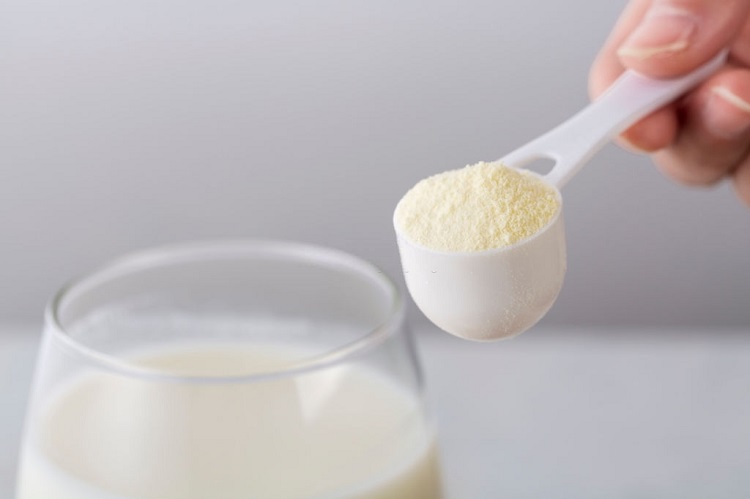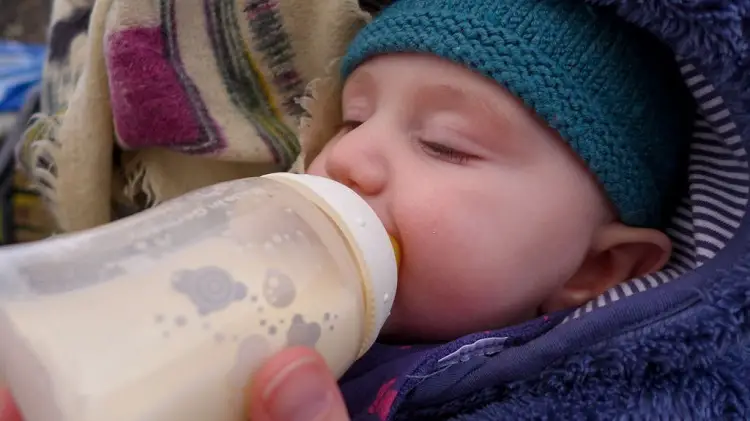This is usually the type of experience anyone who has handled baby food would relate to.
When you’re introducing solid foods to your baby, perhaps you might have realized that it doesn’t just come out as expected and you’re beginning to wonder, oh, why is my baby formula so foamy?
These are common experiences with first-time moms to parenting, this usually happens to some people during the first few times of making baby food.
Either as a result of inexperience or low quality, feeding your baby foamy food can cause digestion issues as the foam is mostly air.
Read on as we discuss the question of why is my baby formula so foamy along with other formula-related questions.
What Causes A Foamy Formula?
There could be other reasons why your baby foods produce foam but the most common reasons are the mode of preparation and the quality of the formula.
Mode of Preparation
During the preparation of your baby food, you might have whisked it more rigorously than necessary causing it to foam.
Most of the products come with a step-by-step direction on how to prepare the foods, it is better to follow up until you’ve mastered the technique involved in getting the desired results.
Product Quality
Just as there are different grades of quality for our clothes, so there are different grades of quality for baby formula. All the products may offer the same type of food but the quality will not be the same.
Maybe the lapse is from the point of production or that is just the much that particular brand can do, some products tend to foam excessively no matter how gently you whisk the food.
Why is My Baby Formula So Foamy?
After a series of trials, you may still be wondering, why is my baby formula so foamy? Here is a hint; if you are sure about the quality of your baby’s food then the foaming is definitely from your end.
How you prepare your baby’s food can determine if it will be foamy or not. When you’re adding the powder into water, be careful not to steer too much or too fast.
Steering it too much may lead it to become too soft and “weak” and it becomes prone to foaming if you should continue steering.
When you begin to steer with too much speed than necessary, the formula can also foam.
Must Baby Formula Be Foamy?
When a formula is prepared in certain ways there is usually a presence of foam, however, this doesn’t mean there’s an issue with the bottle.
Its best advised to get rid of the bubbles before feeding them to your baby. Feeding your baby foamy milk can potentially cause digestion issues, gas, or even excessive spit-up.
If you notice the presence of foam in your baby’s formula, don’t panic, these things can happen. Just make sure to follow the mixing guideline properly.
Do All Formulas Foam Up When Mixed?
Normally, all baby formula brands are likely to when mixed; however, some brands are more likely to bubble up than others.
Any solution when shaken vigorously is likely to yield foam and/or bubbles to form, therefore your baby formula mixed with water is what is going to result in your baby formula foaming.
While there are so many brands of formulas in the market, finding a formula with high quality will cause less foaminess when being prepared.
Here are a few formulas that are less likely to foam up when mixed:
- Similac Pro-Advance Non-GMO Infant Formula
- Enfamil NeuroPro Enfamil Neuropro Infant Formula Powder
- Happy Family Baby Organic Stage 1 Infant Formula Sensitive
- Similac Alimentum Hypoallergenic Infant Formula
- Earth’s Best Organic Dairy Infant Powder Formula with Iron, Omega-3 DHA, and Omega-6 ARA
Does Foamy Formula Cause Gas?
If you’re baby accidentally drank some foamy formula! Don’t panic it’s okay.
One of the side effects that may result from offering your baby foamy formula is gas, but there is no long-lasting implication, which can be extremely painful for your child.
This is why child care experts suggest you try and eliminate the foam before introducing it to your baby.
If you do not notice any foam and your baby ends up developing gassy symptoms, you can follow these doctor-recommended ways to help relieve gassiness in babies.
Read Also: Best Formula For Acid Reflux and Gas
How to Prevent Foam in Baby Formula?

While the foamy formula isn’t all that bad, it is not a bad idea to feed your little one formula with as little foam as possible.
This may prevent stomach issues and throw-ups, we’ve all been there.
Preparing your baby’s formula the right way will help prevent foaminess and make for a much happier family.
Here are simple things you can do to mix your formula to help remove the foam:
- Wash your hands
- Prepare formula in advance
- Use cold water, then heat up
- Use hot water
- Stir slowly
- When stirring use a fork instead of a spoon
- Prepare a large batch of formula for night feeds
- Use a vented bottle
- Scoop the foam out
- Choose your formula wisely
Read Also: Formulas That Taste Closest To Breast Milk
Tips On How To Preserve And Reheat Baby Food
Here are a few tips on how to preserve baby food and reheat it:
- While feeding your baby, be sure your hands or food/feeder are not exposed to a germ-prone environment or surface.
- Keep the feeder airtight after you’re done feeding your baby to ensure it is not exposed to contaminated air.
- This should not exceed the day the food was prepared, except if it was during the night, else dispose of all foods that have stayed for more than 24 hours as some food may lose their nutrients and change taste over time if kept for too long.
- Double boil. Boil some water in a big enough pot and insert the feeder into it, leave it for 30 minutes or more if it requires it to heat up.
- Check to be sure the food is warm enough and you can feed your baby.
Other Frequently Asked Questions
Can a baby formula be preserved?
Many parents wonder if their baby’s unfinished food can be presented for later. Well, the answer is yes you can save your baby’s remaining food and feed him with it later.
This may not be the best news to parents who are very particular about feeding their baby stale food and can afford to buy more just to make sure their little one doesn’t eat the same formula twice. But to those who are working on a budget, the news is great.
Preserving baby foods helps to reduce wastage and save money so that instead of throwing away the unfinished food only to prepare another one in a matter of hours, you can just preserve the unfinished one and reheat it later.
Between breast milk and formula, which is more filling?
Breast milk seems like the best guess when considering the vitality of baby food but unfortunately, it is not as filling as baby formula.
This is because breast milk is produced according to the function of the mother’s estrogen which means, that if the mother has a low estrogen level, the breast milk is limited and the baby can only get what it sees.
But for the case of a formula, it is measured by an adult according to the recommendation given by experts which are estimated to keep the baby full until it no longer wants it.
While both are very much needed for the development of the baby, organic formulated foods are more filling.
When is the right time to start giving my baby formula?
The decision to wean off a baby from breast milk is dependent on the parent’s choices.
Some parents wean their babies at 1 year, others 1 year and 6 months due to health challenges or personal reasons. Ideally, a baby can be weaned when you notice a balance in his neck movement.
Observe when your baby can hold his head steadily and turn on either side perfectly. This indicates that he can take solid food without easily choking
Related Posts:
- How To Store Formula Milk For Night Feeds
- What Happens If Baby Drinks Hot Formula
- What Happens If Baby Drinks Spoiled Formula Milk
Conclusion
After trying your best to follow the instructions on how to make your baby’s formula perfectly and the question of why is my baby formula so foamy is still on your lips, the best solution is to try another brand of good quality baby food because obviously, the problem is not from your end.
